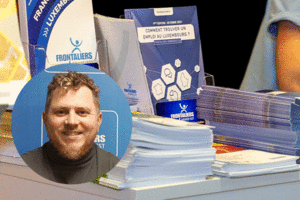News
Three questions for Julien Dauer, director of Frontaliers Grand Est
March 2023
With more than 200,000 border workers, the Grand Est region is a laboratory for European mobility. As a member of the MOT network, "Frontaliers Grand Est" accompanies these numerous border workers on a daily basis. Julien Dauer helps us better understand the challenges they face.
What is the situation of border workers in your territory?
Despite a health crisis that may have raised fears in regard to the border phenomenon, we are seeing more and more interest in cross-border mobility.
Projections on the occupation of border workers in Luxembourg but also in Switzerland are clear, and numerous projects in Belgium and Germany - whether for students, health care or the establishment of companies - mean that the cross-border phenomenon in our territory will continue to grow. The Grand Est is a real laboratory for European mobility with more than 200,000 people choosing to work in a neighboring country. This does not include the mobility of consumers or patients. However, there are still obstacles such as the language barrier at the administrative level or the impact of certain national legislations that can affect the unique situation of border workers.
What is the role of Frontaliers Grand Est?
Our structure aims to be a facilitator of overcoming challenges.
Founded in 1993, and currently benefiting from the financial support of the European Commission and the Grand Est Region, Frontaliers Grand Est is present on the territory to inform employees, students, job seekers and companies about the living and working conditions on both sides of the Grand Est borders.
Historically, the creation of our association is simply linked to the establishment of the EURES network by the European Commission. Frontaliers Grand Est has integrated various EURES networks and is now one of the biggest contributors in terms of actions of the EURES Grande Région network.
Our expertise covers all the borders of the Grand Est - and because of our expertise, the public contacting us spans from the Hauts-de-France to the Jura.
We are also at the disposal of our elected officials and funders to take stock of the legislative obstacles that have been brought to our attention.
What changes do you recommend to improve their situation? Are there any recent or upcoming developments?
It is necessary that the States - and mainly their administrations - reinforce their exchanges. A legislative change in one country can have an impact on the situation or attractiveness of its neighbor.
In our opinion, the development of our territory and its attractiveness is one of the levers to amplify the cross-border phenomenon and contribute to responding to a demand from companies in multiple territories (the Grand Est Region and the Greater Region for us). A quick look at the exchanges within the Greater Region on the issue of cross-border telework are enough to see that positive developments are possible for the workers of this territory.
More info [FR]

